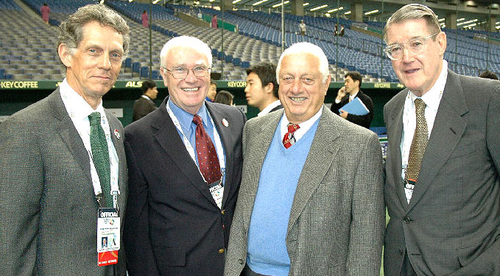Japan was one U.S. victory over Mexico from elimination in Round 2, and Cuba escaped first-round elimination by Ruben Rivera of Panama instinctively jumping out of the way of a pitch that would have forced in the winning run. And although a runner-up in the first two rounds, Japan prevailed tonight and became the first World Baseball Classic champion, beating Cuba, 10-6. Cuba fought back the whole game, even getting within one run in the eighth inning, but could not overcome the uncharacteristic shaky start by three Cuban pitchers in a marathon first half-inning as Japan put up four runs ( 350K) before Cuba ever came to bat.
350K) before Cuba ever came to bat.
A sellout crowd seemed pretty split in their loyalties, although the Cuban fans made much more noise. On the other hand, the Japanese fans were noticably more demonstrative than they were in the games in the Tokyo Dome in Round 1, even in the deciding game against rival Korea, and became increasingly noisy as the game wore on.
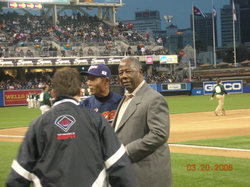
Too many dignitaries were here tonight to begin to list them, although we were joined by Mayor Williams of D.C. again and senator Kent Conrad of North Dakota. Commissioner Negoro of Japan was on hand to accept the winning trophy from Commissioner Selig. What a thrill the opening ceremony was watching all-time Major League home run champion Hank Aaron walk arm-in-arm with, and be handed the ceremonial first pitch ball by, the all-time Japan home run champion and the Japanese manager, Sadaharu Oh. Hank delivered the first pitch to the Cuban catcher, Ariel Pestano, a veteran of international play and one of the key components of Cuba’s incredible run in the tournament.
It was also another big weekend for the Habitat for Humanity site here at the ballpark. On Sunday, in a remarkable show of sportsmanship and compassion, both the Cuban and Japanese teams showed up and autographed the houses and offered their support. On Monday morning, Hall of Famer Dave Winfield graciously got up in the middle of the night and was at the site at 5 a.m. for a "Today" show appearance promoting the event and the Habitat buildout. And at a press conference just before the game, the Partnership for a Drug-Free America unveiled its new anti-steroid PSA ( 350K) in partnership with MLB, following on the heels of last year’s very successful crumbling statue PSA, at a press conference with Commissioner Selig and Steve Passierb, President and CEO of PDFA.
350K) in partnership with MLB, following on the heels of last year’s very successful crumbling statue PSA, at a press conference with Commissioner Selig and Steve Passierb, President and CEO of PDFA.
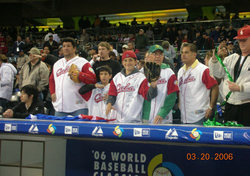
Ratings have stayed good. In Japan, the Japan/Korea game Saturday night averaged a 36.2 and peaked at over a 50 share. Since today is a holiday in Japan, I assume tonight’s rating will be a monster as well. Noby Ito of the NPB and winning Japan delegation predicted an even bigger number than Saturday night. And there is no reason to think that the Cuban ratings have fallen from their 90 share. Domestically, we more than held our own, even against the NCAAs on Saturday and even without the U.S. team in the semifinals. And whatever short-term rating loss we may have suffered at home by having Cuba and Japan in the finals, or because ESPN joined the game in-progress tonight, we made up for in long-term event credibility.
Even though I thanked them during one of my early blogs from Japan, I would be wrong to not again say what a phenomenal job our International Department did to a person in pulling off the logistics of this first-time event, led by Senior Vice President Paul Archey. His entire staff has run itself ragged for the past three months to ensure as few snafus as possible, and to accommodate the needs of 17 different baseball federations, 16 different rosters, thousands of press, multiple broadcast partners and almost 750,000 fans in six different venues. I also would again acknowledge the role and efforts of the MLBPA, from Don Fehr and Gene Orza to their staff and those who served on the technical committee. In fact, the entire technical committee deserves enormous credt for seeing this through without incident.
Thanks to the IBAF: President Aldo Notari, who was at most of the games, and Miguel Ortin, who was also at many, for their leadership and for administering the drug-testing program. My thanks to our promoters in Japan and San Juan, and our hosts in Orlando, Phoenix and San Diego for their fine work, and to mlb.com for its coverage of the event and sale of tickets, including moving a lot of tickets the last weekend in the secondary market when the final pairings were set. Productions and broadcasting were everwhere and I am sure a great DVD will be shortly forthcoming, up to their Emmy-winning standards. Our special-events people were also terrific, having to pull this together at a number of disparate venues and not knowing which teams would advance often until the day before they would travel to the next site. And I also would like to acknowledge the fine work MLB’s entire security staff did throughout, particularly given the unique participation by both China and Cuba and the protocols that required. But all in all, I know I speak for all of the people I just mentioned in saying we are all honored to have been involved in this and will look back in 20 years and say we were in on the ground floor of a great international compeitition that celebrated the great game of baseball and took it to a new level.
I also thank all of you for your passion and interest. No shock that I found your comments more interesting than what I wrote. They were, for the most part, very thoughtful, even when they disagreed with the event or how it was run, and many of your suggestions and ideas will be reviewed as we look at doing this again. I will close this with my choices for various "awards" for the inaugural World Baseball Classic. I welcome your continuing suggestions for improvement of the event.
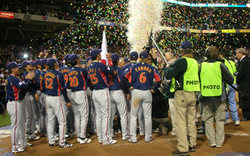
Get ready for an exciting 2006 Major League Season, and we will see you in 2009. Best wishes.
First Hit – Hee Seop Choi (Korea) – Double, in the second inning against Taipei.
First home run – Wei Wang (China) – Game 1 against Japan ( 350K).
350K).
Most Impressive Performance (Team) – Korea going all seven games that it played without an error
Most Impressive Performance (Player) – Seventeen-year-old Shairon Martis (Netherlands), who pitched a seven-inning, complete-game no-hitter against Panama, facing just 22 batters, allowing one walk and recording the final out on his last allowable 65th pitch, inducing a double-play grounder.
Most Exciting Play – Adam Stern (Canada) – inside-the-park home run against U.S. in Canada’s stunning win ( 350K)
350K)
Best Defensive Play – Jin Young Lee (Korea) – A catch ( 350K) against Japan in right field in the first game between the two teams at Tokyo Dome, which kept Korea in the game at the time and allowed its winning rally.
350K) against Japan in right field in the first game between the two teams at Tokyo Dome, which kept Korea in the game at the time and allowed its winning rally.
Most ironic event – Seung Yeop Lee (Korea) hit a home run ( 350K) to beat Japan in Round 1 in Tokyo. He plays for defending Japanese champion Chiba Lotte Marines during the regular season.
350K) to beat Japan in Round 1 in Tokyo. He plays for defending Japanese champion Chiba Lotte Marines during the regular season.
Biggest disappointment – U.S. going 3-3.
Biggest surprise (team) – Play of Mexico, which beat Canada, split two games with the U.S. and played Korea and Japan very tough in its games with them.
Biggest controversy – Two questionable calls, by the same American umpire, that went in favor of the U.S. in two critical games.
Narrowest escape – Cuba, which might not have advanced to Round 2 if Ruben Rivera had not avoided being hit by a pitch in the ninth inning of the game between Cuba and Panama.
Most enthusiastic fans:
Round 1 – Venezuela
Round 2 – Puerto Rico
Round 3 – Korea
Best food (overall) – San Diego’s PETCO Park
Best food (single item) – Plantain Chips (Hiram Bithorn)
Biggest deal with smallest impact – Pitch-count restrictions
Rule I would most like to see changed for next time – Crossover pairings in semifinals
Best Quote #1 – Commissioner Bud Selig: "Baseball was born in America, but now it belongs to the world."
Best Quote #2 – Ambassador Thomas Schieffer, U.S. Ambassador to Japan in discussing why China will be a long-term force in international baseball: "Remember that in China, when you are one in a million, there are 1,300 of you."
Best Quote #3 – Steve Hirdt, Elias Sports Bureau: "Next year, we’ll all be missing the World Baseball Classic," quoted by Tom Verducci on SI.com.
Reasons to do the event again – Every player who committed to the event and every fan who was enthusiastic throughout
Reasons to not do the event – Myopia
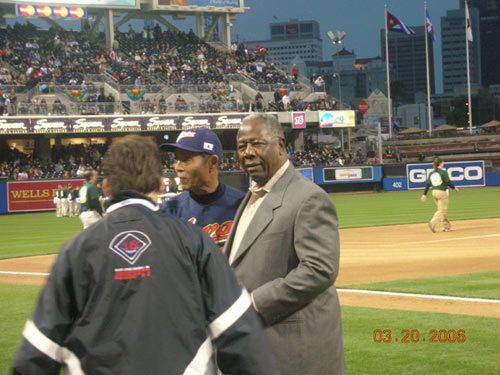
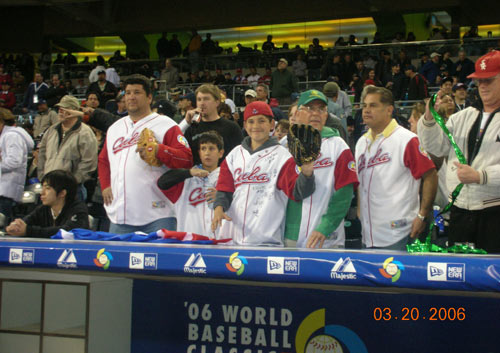



 Tonight we had the first
Tonight we had the first 
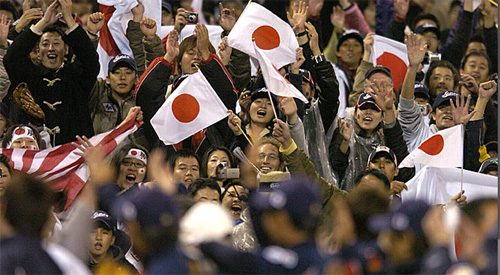
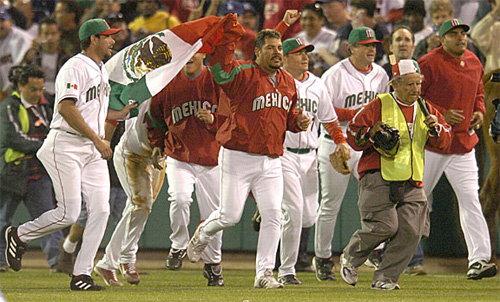
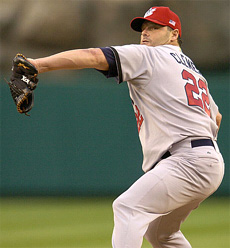 3.
3. 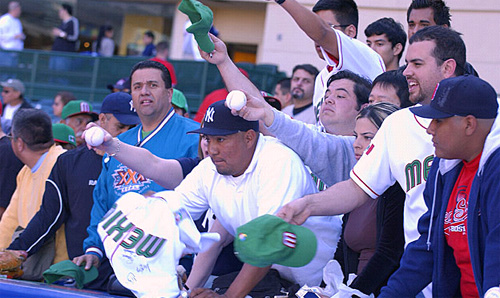
 Things got really hot in the bottom of the seventh, when second base umpire James Hoye called the Puerto Rican baserunner safe when the Cuban shortstop was pulled off the bag on a force play, allowing a run to score and leaving two men on with none out. The Cuban manager, Higinio Velez, complete with intepreter in tow, came out and argued the play vociferously and when he refused to stop arguing he was thrown out of the game. (The interpreter was allowed to stay). The bench partially emptied, and it took some time for order to be restored, with the crowd roaring the entire time.
Things got really hot in the bottom of the seventh, when second base umpire James Hoye called the Puerto Rican baserunner safe when the Cuban shortstop was pulled off the bag on a force play, allowing a run to score and leaving two men on with none out. The Cuban manager, Higinio Velez, complete with intepreter in tow, came out and argued the play vociferously and when he refused to stop arguing he was thrown out of the game. (The interpreter was allowed to stay). The bench partially emptied, and it took some time for order to be restored, with the crowd roaring the entire time.  By the way, from what I can glean from our information, meetings with Cuban officials, the story in today’s USA Today, and conversations with IBAF officials, this is not a team of Cuban second-stringers, as has been suggested in some of the postings. These are the best players Cuba has to offer, including perhaps the best player from the island, second baseman Yulieski Gourriel. Their whole lineup is made up of veterans of international play.
By the way, from what I can glean from our information, meetings with Cuban officials, the story in today’s USA Today, and conversations with IBAF officials, this is not a team of Cuban second-stringers, as has been suggested in some of the postings. These are the best players Cuba has to offer, including perhaps the best player from the island, second baseman Yulieski Gourriel. Their whole lineup is made up of veterans of international play.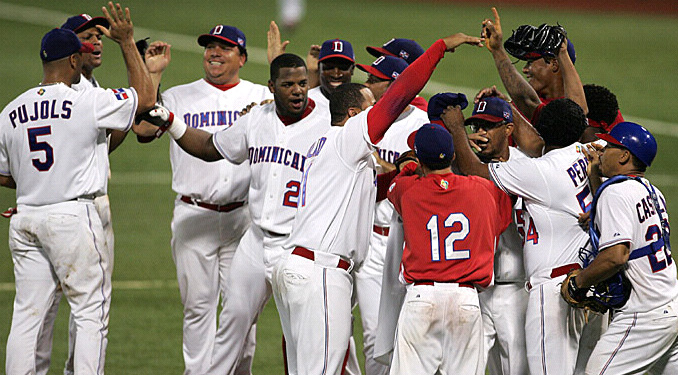
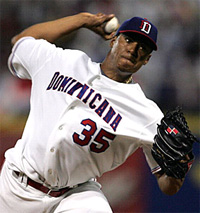 By about the seventh inning, people started to inquire about what would happen if the game ended in a 1-1 tie after 14 innings. Fortunately, it never came close to that, but if I understand the rules, assuming there was not a tie in the game tomorrow night, it would have come down to batting average in tonight’s game to determine the winner since head-to-head, runs and earned runs would all have been equal. But there were lots of nervous moments to the very end, with Venezuela leaving the bases loaded in the top of the ninth. Dominican pitcher Daniel Cabrera was dominant over the first four innings, allowing no hits and getting readings in the high 90s for his fast ball, and Venezuela continued to have trouble hitting, getting only a single hit off the five Dominican pitchers — a fifth-inning double by Omar Vizquel.
By about the seventh inning, people started to inquire about what would happen if the game ended in a 1-1 tie after 14 innings. Fortunately, it never came close to that, but if I understand the rules, assuming there was not a tie in the game tomorrow night, it would have come down to batting average in tonight’s game to determine the winner since head-to-head, runs and earned runs would all have been equal. But there were lots of nervous moments to the very end, with Venezuela leaving the bases loaded in the top of the ninth. Dominican pitcher Daniel Cabrera was dominant over the first four innings, allowing no hits and getting readings in the high 90s for his fast ball, and Venezuela continued to have trouble hitting, getting only a single hit off the five Dominican pitchers — a fifth-inning double by Omar Vizquel. They have four numbers retired in the stadium, Bithorn’s (#25), Hall of Famers
They have four numbers retired in the stadium, Bithorn’s (#25), Hall of Famers  "If you want your millionaire players to dive for pop-ups, run the bases with abandon, watch the entire game like Little Leaguers from the top step of the dugout and play the game for pride and for fun, just like American Legion ball…the (World Baseball Classic) is your ticket to happiness. To a man, the U.S. players have raved about the experience. Chipper Jones, a World Series champion and MVP, called the (Classic) ‘the best baseball experience of my life — bar none’."
"If you want your millionaire players to dive for pop-ups, run the bases with abandon, watch the entire game like Little Leaguers from the top step of the dugout and play the game for pride and for fun, just like American Legion ball…the (World Baseball Classic) is your ticket to happiness. To a man, the U.S. players have raved about the experience. Chipper Jones, a World Series champion and MVP, called the (Classic) ‘the best baseball experience of my life — bar none’." I am somewhat puzzled by the postings complaining that games have been switched around by ESPN to
I am somewhat puzzled by the postings complaining that games have been switched around by ESPN to 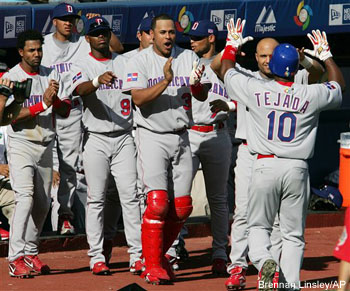 As suggested last night, the four teams in this bracket are now each 1-1, which sets up an intriguing set of two one-game playoffs over the next two nights. The winning team in tomorrow’s game between the
As suggested last night, the four teams in this bracket are now each 1-1, which sets up an intriguing set of two one-game playoffs over the next two nights. The winning team in tomorrow’s game between the  All of the capacity crowd, the noise, the thunder sticks, the music and the magic did not work for the Puerto Rican bats tonight as they were
All of the capacity crowd, the noise, the thunder sticks, the music and the magic did not work for the Puerto Rican bats tonight as they were 
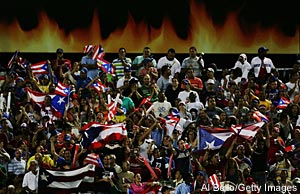 Even a rain shower could not dampen the sold-out crowd’s enthusiasm for the big game tonight between
Even a rain shower could not dampen the sold-out crowd’s enthusiasm for the big game tonight between 